Foreign Service Institute. Polish Familiarization and Short-term Training
Подождите немного. Документ загружается.

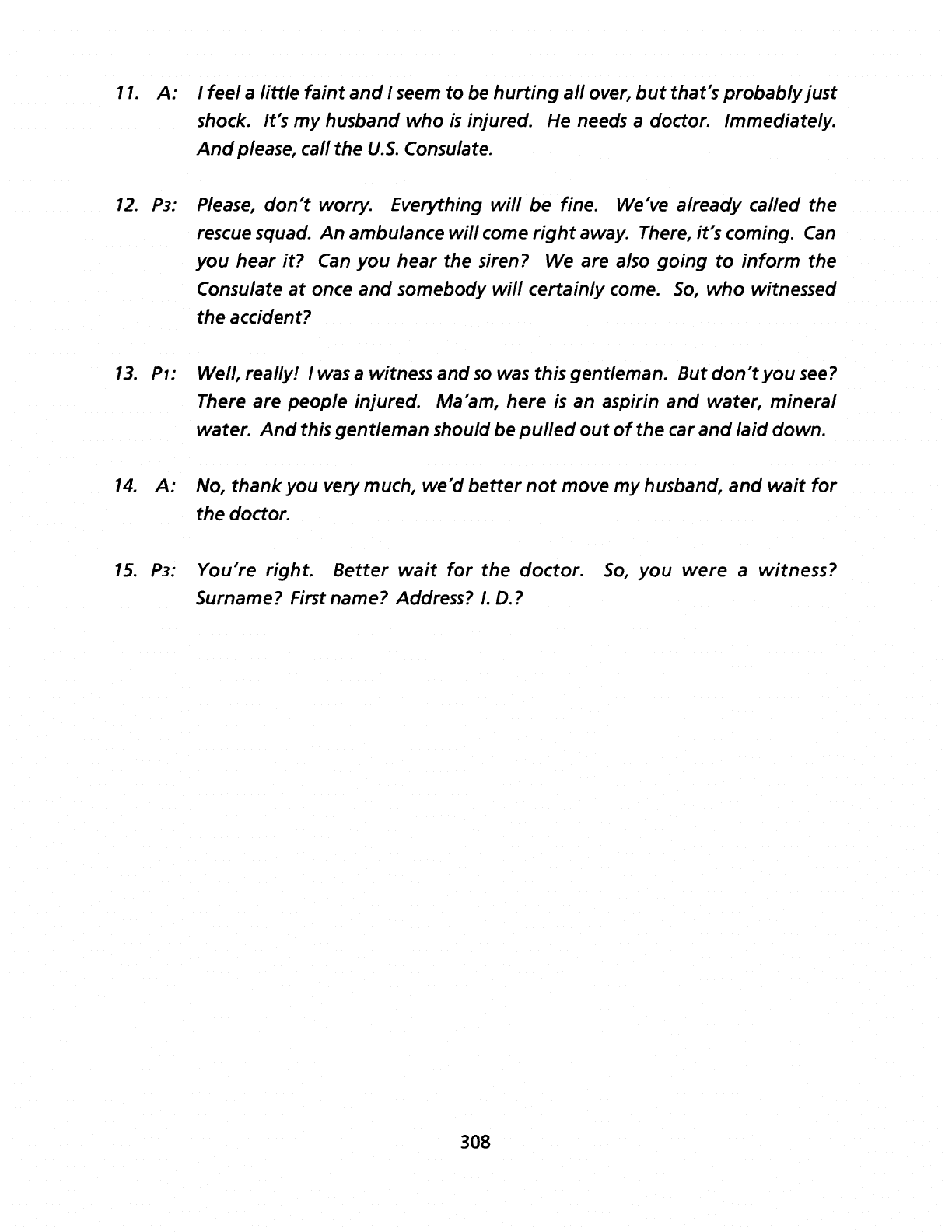
11.
A:
I
feel
alittle
faint
and
I seem to be
hurting
all
over,
but
that's
probably
just
shock. It's
my
husband
who
is
injured.
He
needs a doctor. Immediately.
And
p/ease, cali
the
u.s.
Consulate.
12.
P3:
Please,
don't
worry. Everything
will
be fine. We've already called the
rescue squad.
An
ambulance
will
come
right
away. There, it's coming.
Can
you
hear
it?
Can
you
hear
the siren?
We
are a/so
going
to
inform
the
Consu/ate
at
once
and
somebody
will
certain/y come. 50,
who
witnessed
the
accident?
13.
Pl:
Well, real/y! I was a witness
and
so
was
this gentleman. But
don't
you
see?
There are people injured. Ma'am, here
is
an
asp
irin
and
water,
mineral
water.
And
this gentleman shou/d be
pul/ed
out
of
the
car
and
laid down.
14.
A:
No,
thank
you
very much,
we'd
better
not
move
my
husband,
and
wait
for
thedoctor.
15.
P3:
You're
right.
Better
wait
for
the
doctor.
50,
you
were
a witness?
5urname? First name? Address?
I.
D.?
308
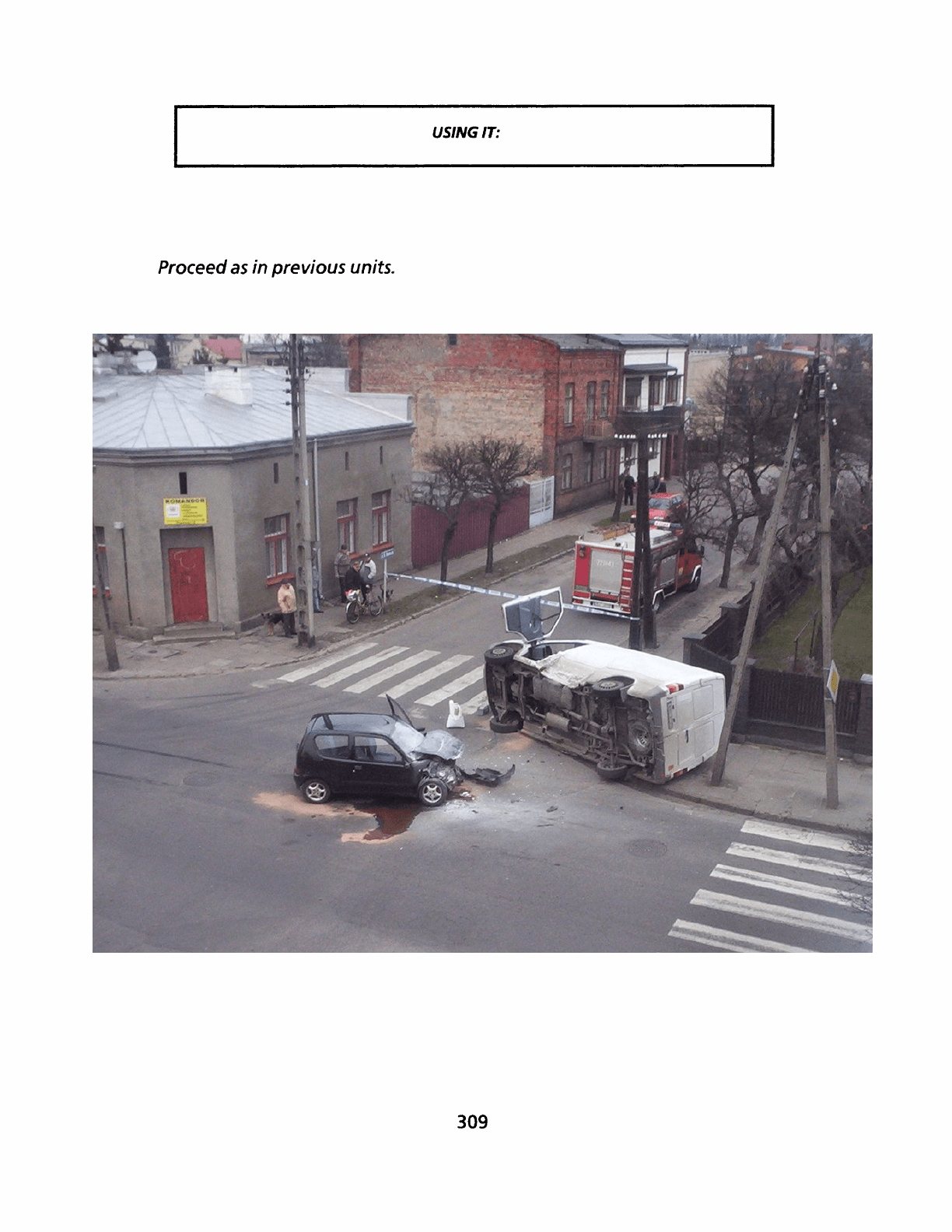
USING IT:
Proceed
as
in previous units.
309
Car accident in Żyrardów
Photo: FxJ
Date: 5 Jun 2008
cc-by-3.0
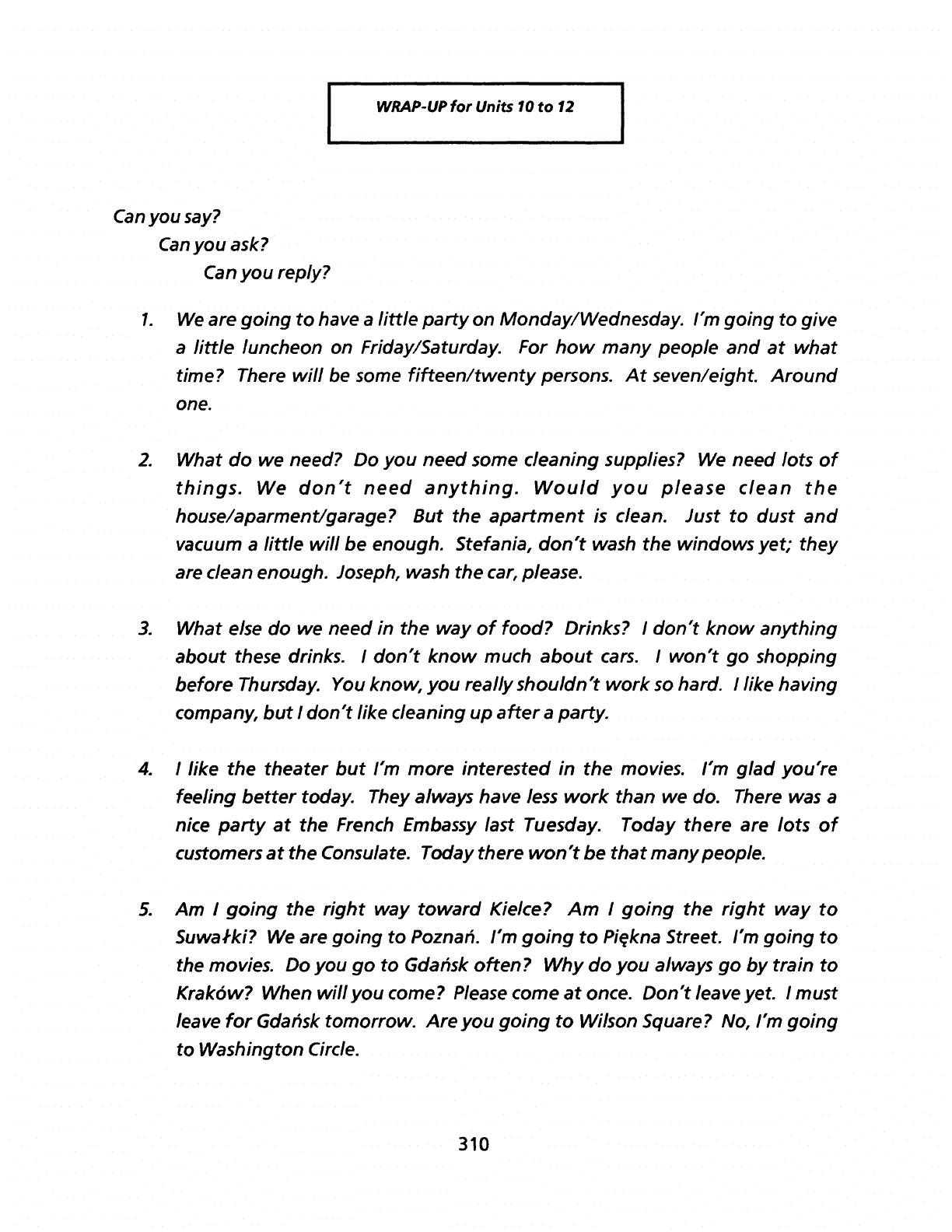
WRAP-UP
for
Units 10
to
12
Canyousay?
Canyouask?
Can
you
reply?
1.
We
are going
to
have a
little
party
on Monday/Wednesday. I'm going
to
give
alittle
luncheon on Friday/Saturday. For
how
many
people
and
at
what
time? There
will
be
some
fifte
e
n/twe
n t y persons.
At
seven/eight.
Around
one.
2.
What
do
we need? Do
you
need some cJeaning supplies?
We
need lots
ot
things.
We
don't
need
anything.
Would
you
please
clean
the
house/aparment/garage?
But
the
apartment
is
cJean.
Just
to
dust
and
vacuum a Iitt/e
will
be enough. Stefania,
don't
wash the windows yet;
they
are
cJean
enough. Joseph, wash the
car,
pJease.
3.
What
eJse
do
we need
in
the
way
of
tood? Drinks? I
don't
know
anything
about
these drinks. I
don't
know
much
about
cars.
I
won't
go
shopping
before Thursday. You know,
you
really shouJdn't
work
so
hardo
llike
having
company,
but
I
don't
Iike cJeaning up
after
a party.
4.
I Iike
the
theater
but
I'm more interested
in
the
movies. I'm g/ad you're
feeling
better
today. They
aJways
have
less
work
than we do. There
was
a
nice
party
at
the
French
Embassy
last Tuesday. Today
there
are /ots
ot
customers
at
the
Consu/ate. Today there
won't
be
that
many peopJe.
5.
Aro I
going
the
right
way
toward
Kielce?
Am
I
going
the
right
way
to
Suwałki?
We
are
going
to
Poznań.
I'm
going
to
Piękna
Street. I'm
going
to
the movies. Do you
go
to
Gdańsk
often?
Why
do
you
always
go
by
train
to
Kraków? When
will
you
come?
Please
come
at
once.
Don't
/eave
yet. I must
leave
for
Gdańsk
tomorrow.
Are
you
going
to
Wilson Square? No,
J'm
going
to
Washington
Circ/e.
310
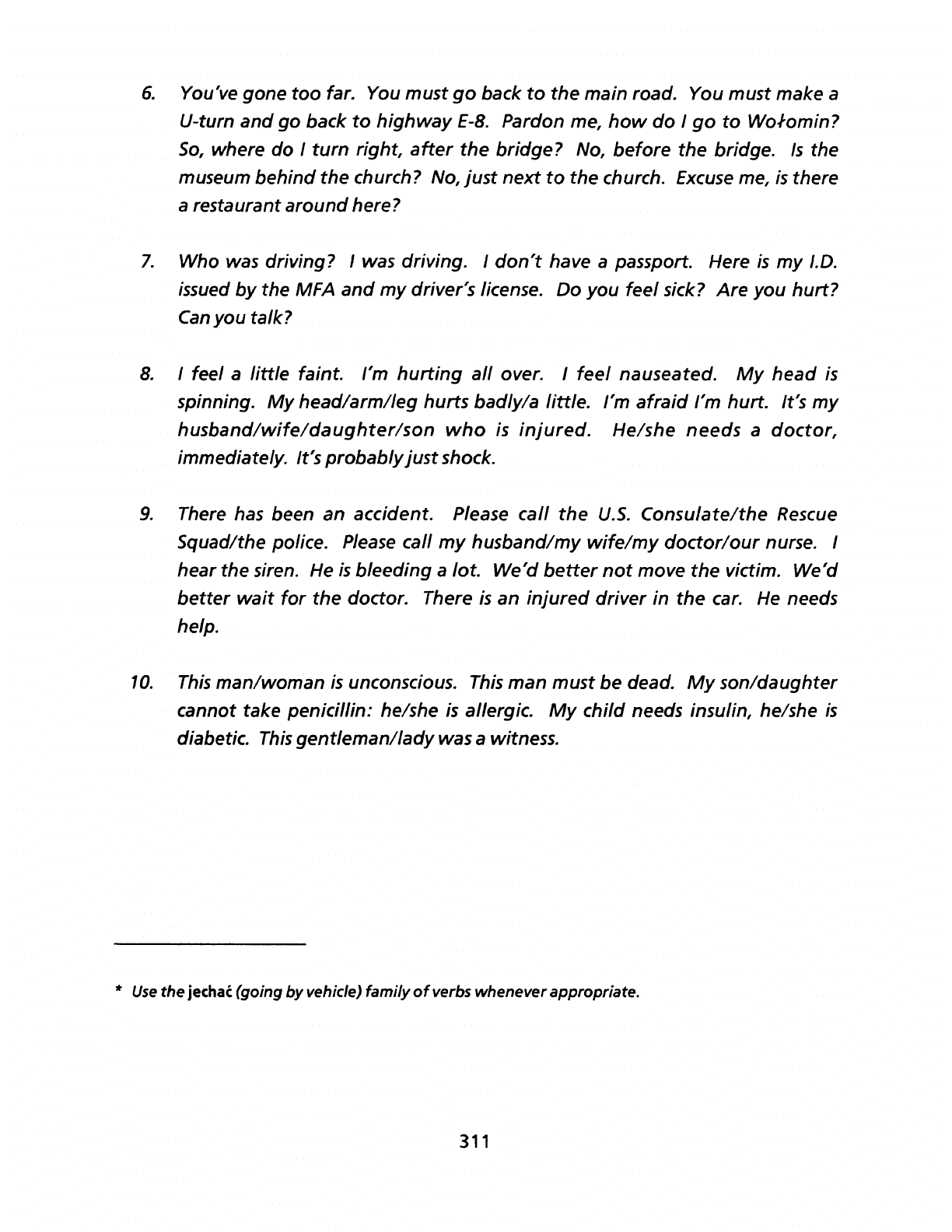
6.
You've gone
too
far. You
must
go
back
to
the
main road. You must make a
U-turn
and
go
back
to
highway
E-B.
Pardon me,
how
do
I
go
to
W%min?
50, where do /
turn
right,
after
the
bridge? No,
before
the
bridge.
/s
the
museum
behind
the
church? No,
just
next
to
the
church.
Excuse
me,
is
there
a restaurant
around
here?
7.
Who was driving? I was driving. I
don't
have a passport. Here
is
my
/.D.
issued
by
the MFA
and
my
driver's license. Do
you
fee/ sick?
Are
you
hurt?
Can
you
talk?
B.
/ fee/ a litt/e fa in
t.
I'm
hurting
all
over. I fee/ nauseated.
My
head
is
spinning.
My
head/arm//eg hurts bad/y/a litt/e. I'm
afraid
I'm hurt. It's
my
husband/wife/daughter/son
who
is
injured.
He/she
needs
a
doctor,
immediately. It's probab/y
just
shock.
9.
There has been
an
accident. P/ease cali
the
U.S.
Consu/ate/the Rescue
5quad/the police.
Please
cali
my
husband/my
wife/my
doctor/our
nurse. /
hear the siren.
He
is
b/eeding a lot.
We'd
better
not
move
the
victim. We'd
better
wait
for
the
doctor. There
is
an
injured
driver in
the
car.
He
needs
help.
10.
This
man/woman
is
unconscious.
This
man
must be dead.
My
son/daughter
cannat take penicillin: he/she
is
allergic.
My
child needs insulin, he/she
is
diabe tic.
This
gentleman/lady
was a witness.
li'
Use
the
jechać
(going
by
vehic/e) family
of
verbs whenever appropriate.
311
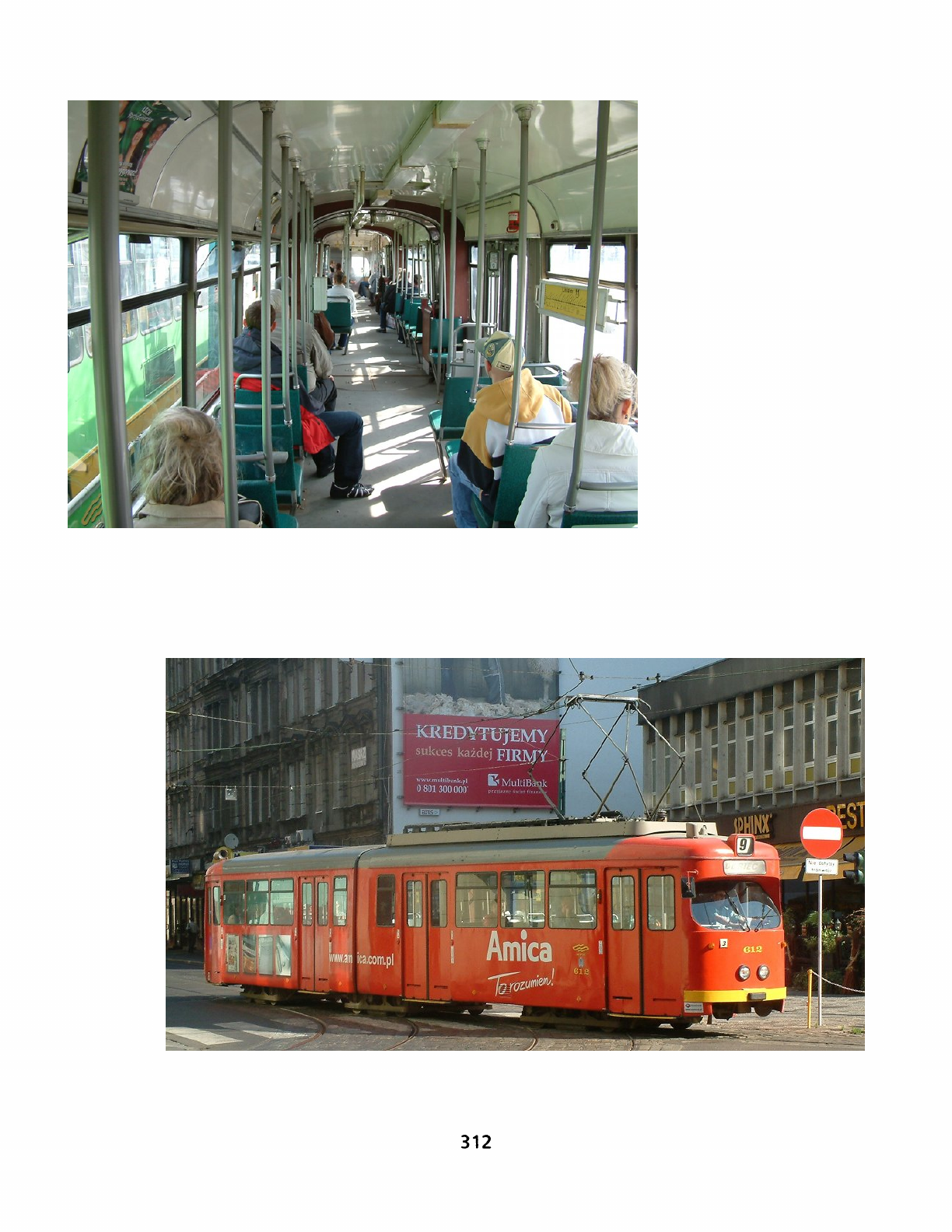
312
Düwag GT6 tram in Poznań
Photo: Radomił Binek
Date: 24 Sep 2006
cc-by-sa-3.0
Interior of Düwag GT8 in Poznań
Photo: Radomił Binek
Date: 9 Apr 2006
cc-by-sa-3.0
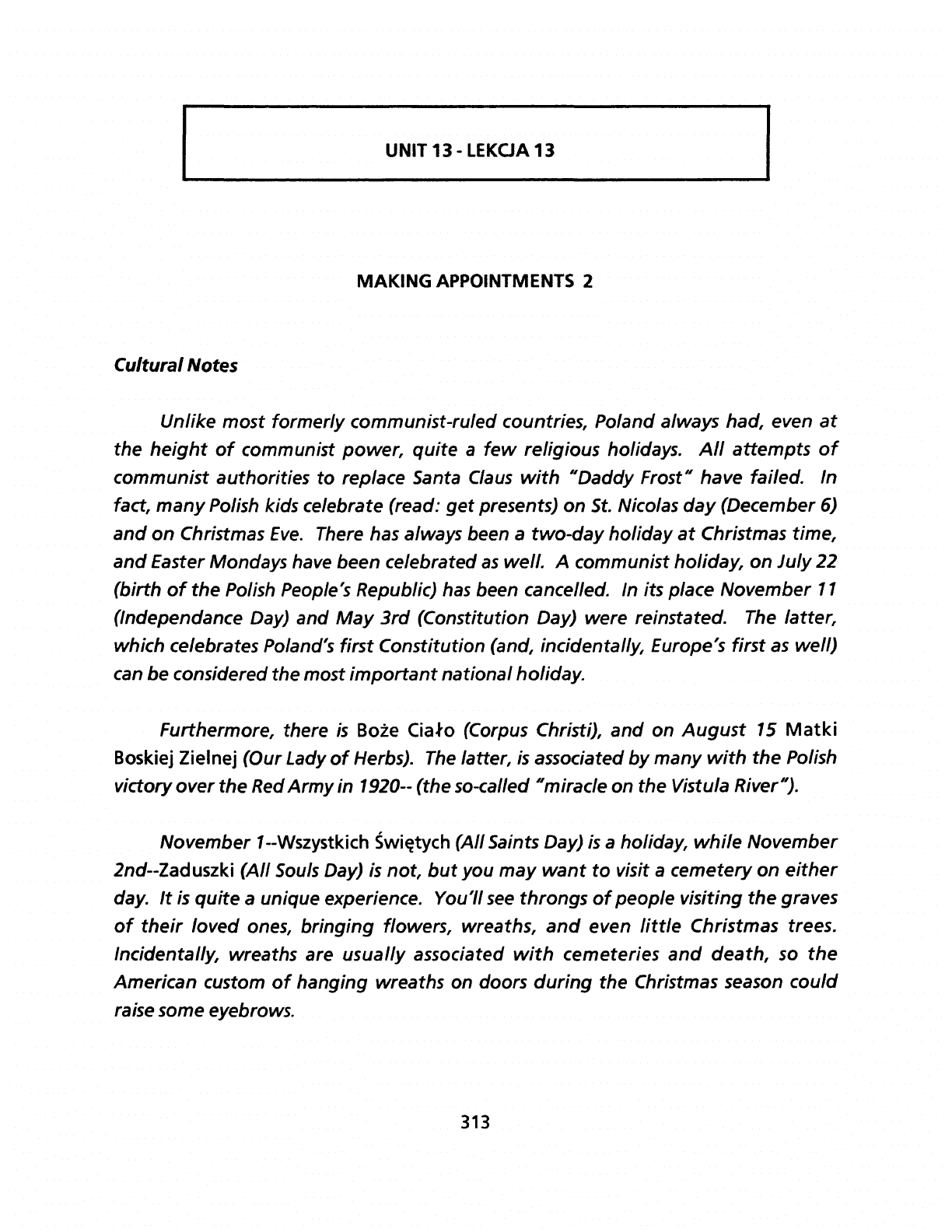
UNIT 13 - LEKOA
13
MAKING APPOINTMENTS 2
Cultural Notes
Unlike most former/y communist-ru/ed countries, Po/and a/ways had, even
at
the
height
ot
communist
power,
quite
a
few
religious holidays.
Ali
attempts
of
communist authorities to rep/ace Santa
C/aus
with
"Daddy Frost" have tailed. In
fact,
many
Polish kids ce/ebrate (read:
get
presents) on St. Nico/as
day
(December 6)
and
on
Christmas
Eve.
There has a/ways been a
two-day
holiday
at
Christmas time,
and
faster
Mondays have been ce/ebrated
as
well. A communist holiday,
on
lu/y
22
(birth
ot
the
Polish Peop/e's Republic)
has
been cancelled. In its place November
11
(lndependance Day) and
May
3rd
(Constitution Day) were reinstated.
The
/atter,
which ce/ebrates Po/and's first Constitution (and, incidentally,
furope's
first
as
we/I)
can
be considered the most
important
nationa/ holiday.
Furthermore, there
is
Boże
Ciało
(Corpus Christi),
and
on
August
15
Matki
Boskiej Zielnej (Our Lady
ot
Herbs).
The
/atter,
is
associated
by
many
with
the
Polish
victory
over
the Red
Army
in 1920-- (the so-called "mirac/e on the Vistula River")'
November
1--Wszystkich
Świętych
(Ali
Sa
in ts Day)
is
a holiday,
while
November
2nd--Zad
uszki (Ali
Sou/s
Day)
is
not,
but
you
may
want
to
visit a cemetery
on
either
day.
It
is
quite
a unique experience. You'l/
see
throngs
of
peop/e visiting
the
graves
ot
their
/oved ones,
bringing
t/owers, wreaths,
and
even
lit
t/e Christmas trees.
Incidentally, wreaths are usually associated
with
cemeteries
and
death,
so
the
American custom
of
hang
ing
wreaths on doors
during
the Christmas season
could
raise some eyebrows.
313
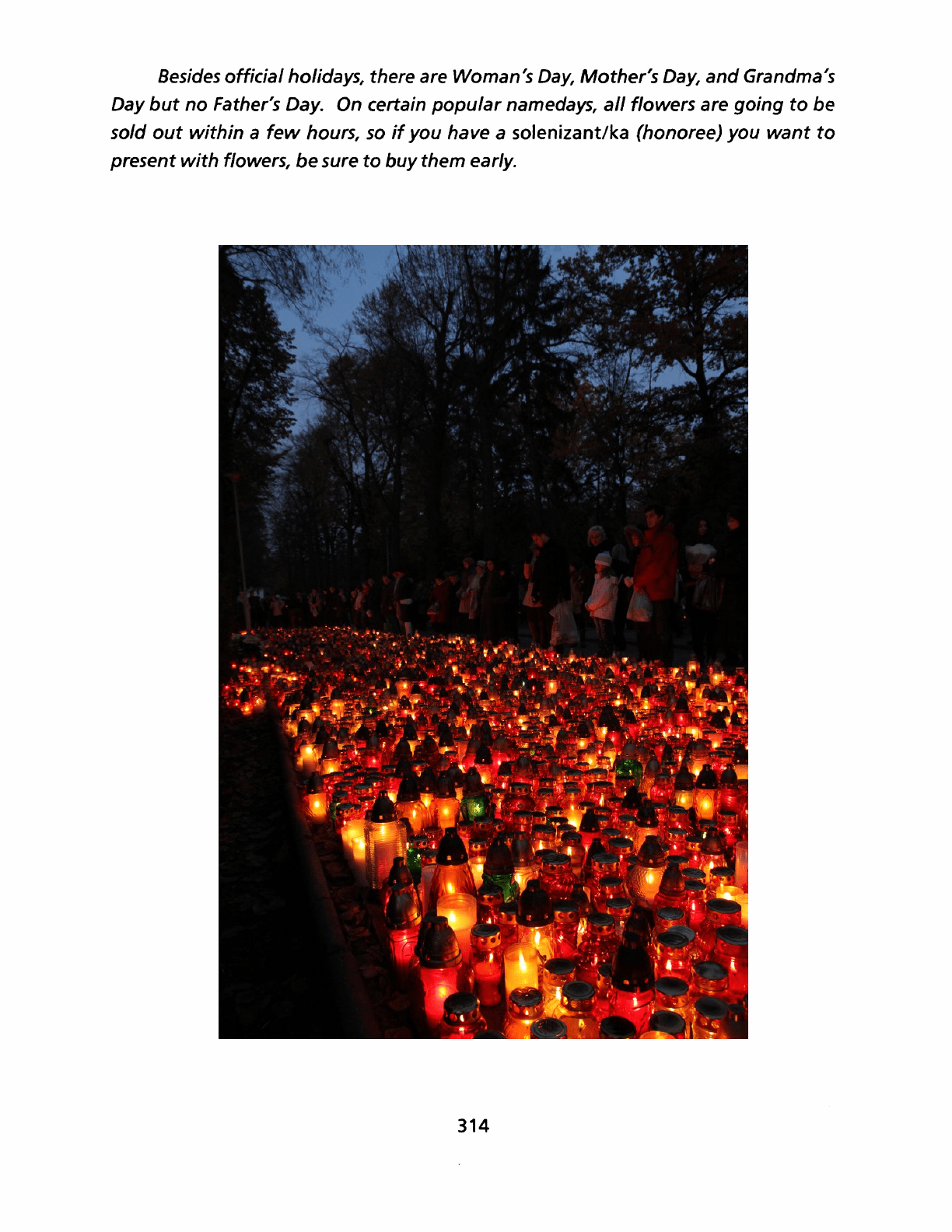
Besides officia/ holidays, there are Woman's Day,
Mother's
Day,
and
Grandma's
Day
but
no
Father's Day. On certain
popu/ar
namedays,
all
f/owers are going
to
be
sa/d
out
within
a
few
hours,
sa
if
you
have a solenizant/ka (honoree)
you
want
to
present
with
f/owers,
be
sure
to
buy
them early.
314
Zaduszki, one day after the All Saints Day when graves are lit up.
Cemetery of Osobowice in Wroclaw
Photo: Klearchos Kapoutsis
Date: 11 Nov 2009
cc-by-2.0
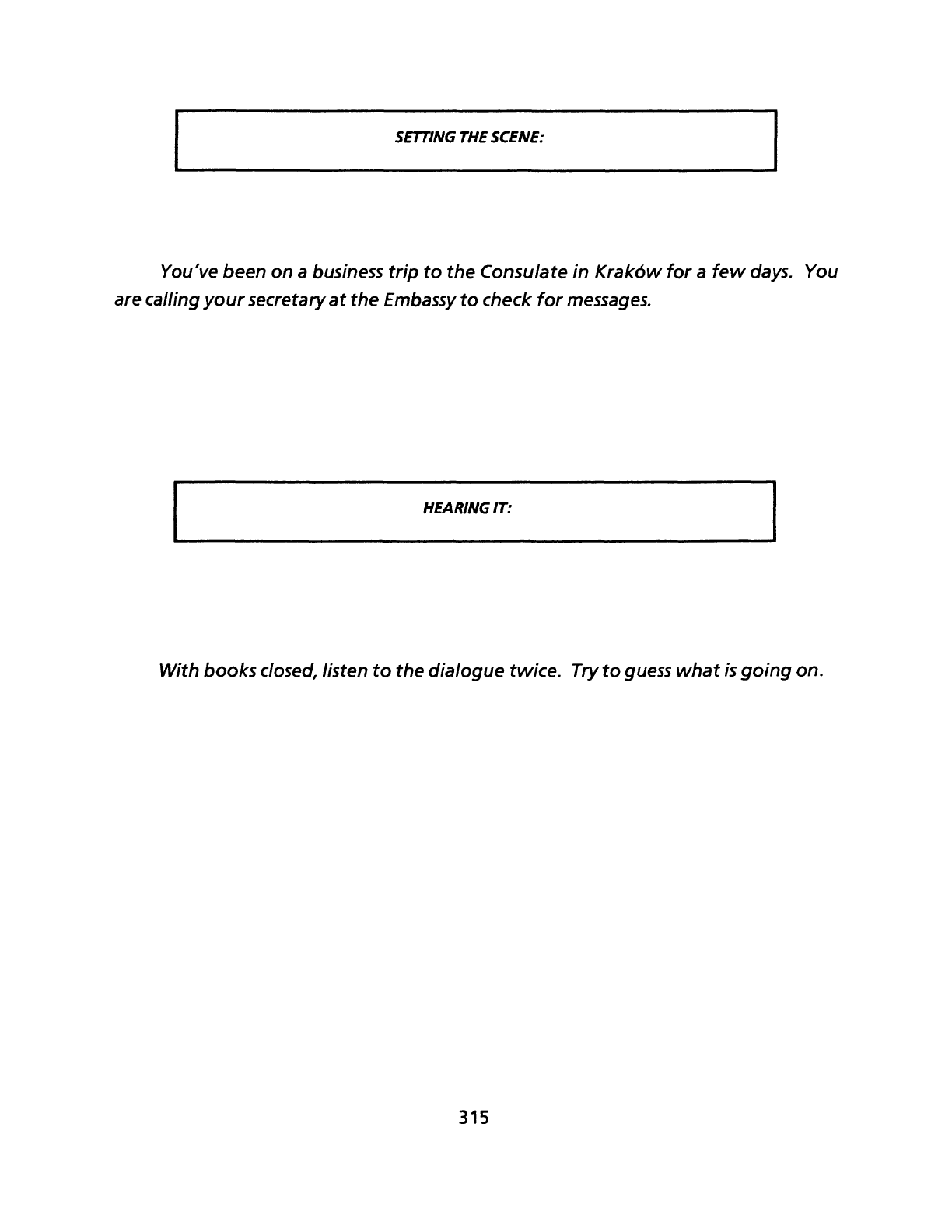
SEITlNG
THE
SCENE:
You've been on a business
trip
to
the
Consulate in
Kraków
for
a
few
days.
You
are cal/ing
your
secretary
at
the
Embassy
to
check
for
messages.
HEARINGIT:
With books closed, listen
to
the
dialogue twice. Try
to
guess
what
is
going
on.
315
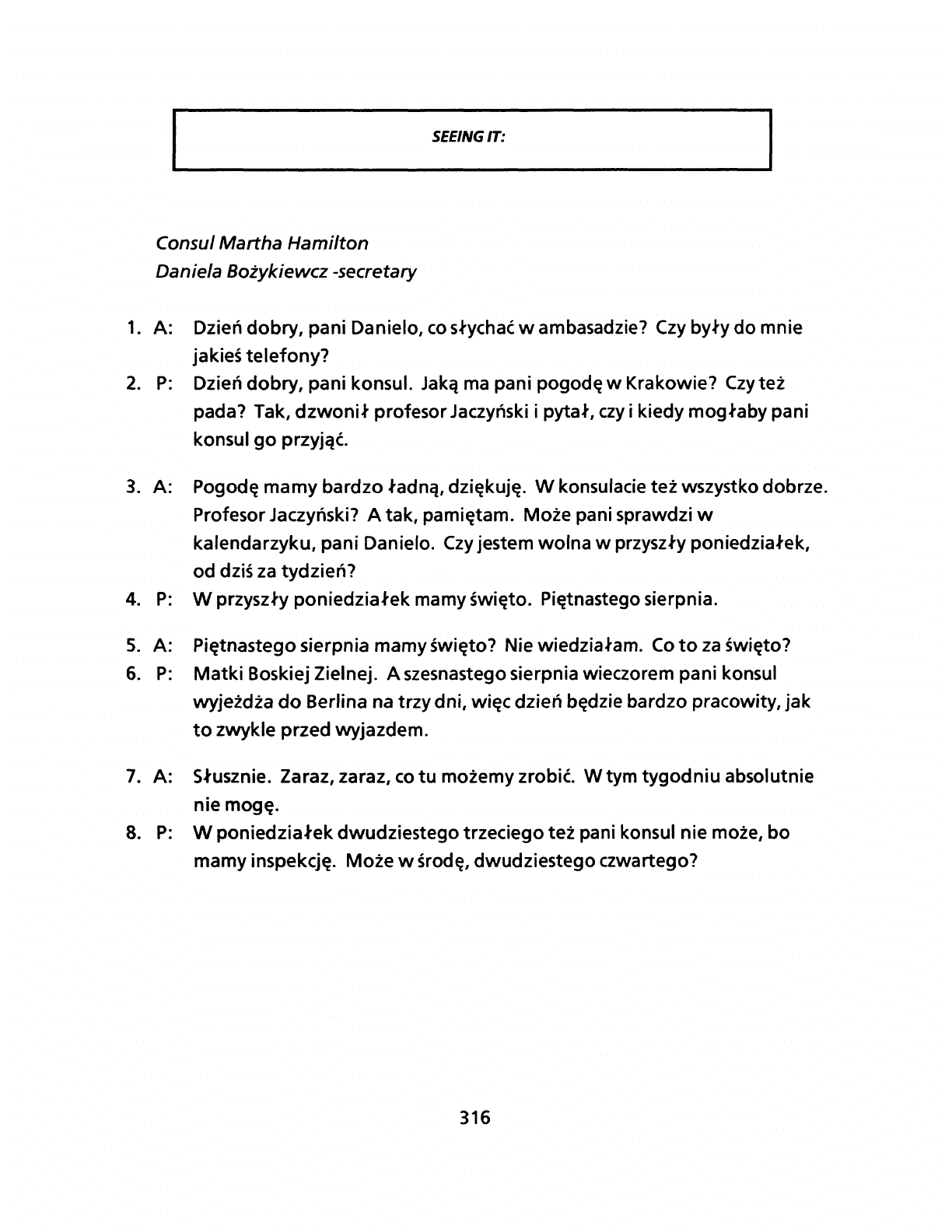
Consul Martha
Hamilton
Daniela
Bożykiewcz
-secretary
SEEINGIT:
1.
A:
Dzień
dobry, pani Danielo,
co
słychać
wambasadzie?
Czy
były
do mnie
jakieś
telefony?
2.
P:
Dzień
dobry, pani konsul.
Jaką
ma
pani
pogodę
w Krakowie?
Czy
też
pada? Tak,
dzwonił
profesor
Jaczyński
i
pytał,
czy
i kiedy
mogłaby
pani
konsul
go
przyjąć.
3.
A:
Pogodę
mamy bardzo
ładną,
dziękuję.
W konsulacie
też
wszystko dobrze.
Profesor
Jaczyński?
A tak,
pamiętam.
Może
pani sprawdzi w
kalendarzyku, pani Danielo.
Czy
jestem wolna w
przyszły
poniedziałek,
od
dziś
za
tydzień?
4.
P:
W
przyszły
poniedziałek
mamy
święto.
Piętnastego
sierpnia.
5.
A:
Piętnastego
sierpnia mamy
święto?
Nie
wiedziałam.
Co
to
za
święto?
6.
P:
Matki
Boskiej Zielnej. A szesnastego sierpnia wieczorem pani konsul
wyjeżdża
do
Berlina na trzy dni,
więc
dzień
będzie
bardzo pracowity, jak
to
zwykle przed wyjazdem.
7.
A:
Słusznie.
Zaraz, zaraz,
co
tu
możemy
zrobić.
W tym tygodniu absolutnie
nie
mogę.
8.
P:
W
poniedziałek
dwudziestego trzeciego
też
pani konsul nie
może,
bo
mamy
inspekcję.
Może
w
środę,
dwudziestego czwartego?
316
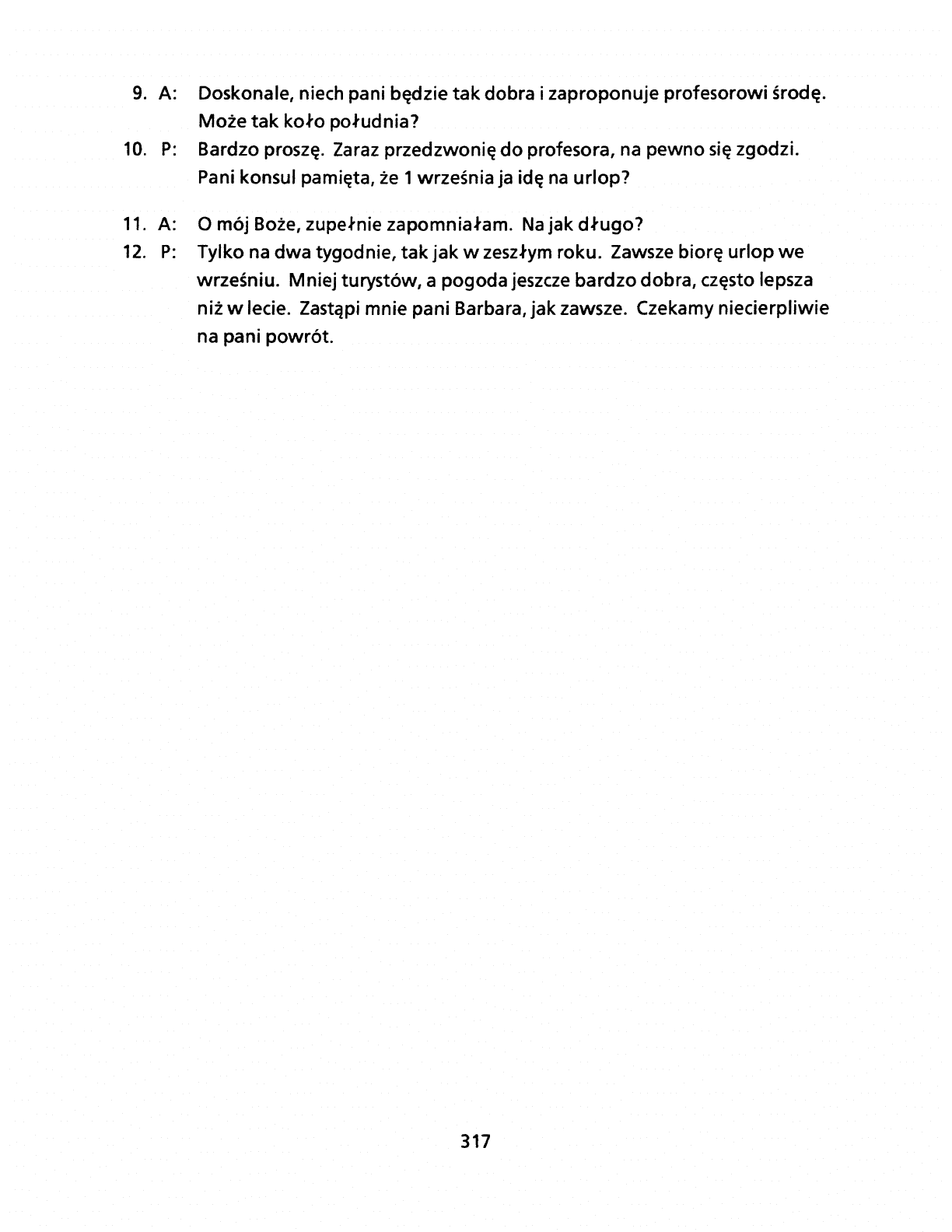
9.
A: Doskonale, niech pani
będzie
tak
dobra i zaproponuje profesorowi
środę.
Może
tak
koło
południa?
10.
P:
Bardzo
proszę.
Zaraz
przedzwonię
do
profesora, na pewno
się
zgodzi.
Pani konsul
pamięta,
że
1
września
ja
idę
na
urlop?
11.
A: O mój
Boże,
zupełnie
zapomniałam.
Na
jak
długo?
12.
P:
Tylko na
dwa
tygodnie,
tak
jak
w
zeszłym
roku. Zawsze
biorę
urlop
we
wrześniu.
Mniej turystów, a pogoda jeszcze bardzo dobra,
często
lepsza
niż
w lecie.
Zastąpi
mnie pani Barbara, jak zawsze. Czekamy niecierpliwie
na pani
powrót.
317
